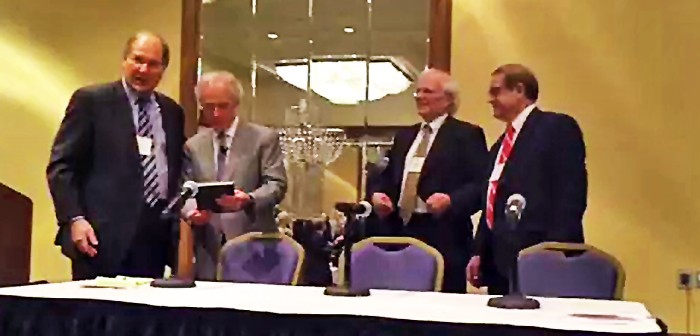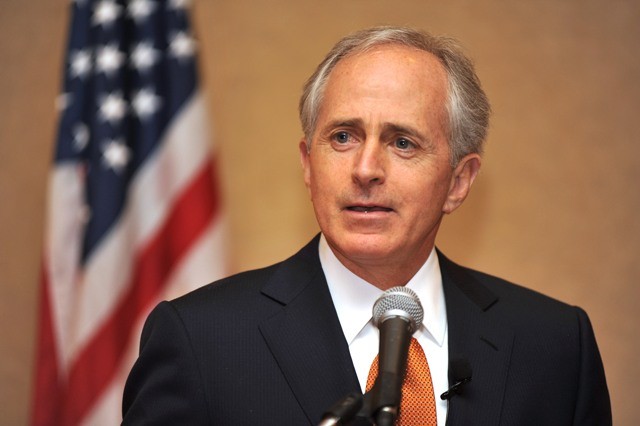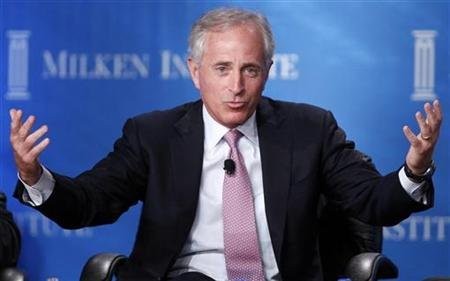 JB
JB
Steve Bares, Economics Club president; the Senator; and co-hosts for the Corker Q-and-A David Cocke and John Ryder
Tennessee has had its share of presidential candidates – on the Democratic side, there have been names like Kefauver, Clement, Gore; on the Republican side, Baker, Alexander, Thompson.
Now comes another one thinking about it — name of Corker.
The junior U.S. Senator from Tennessee, Bob Corker, has the bug. No doubt about it. Speaking to the Economics Club in Memphis at the East Memphis Hilton Wednesday night, Corker fielded a series of questions ranging across the spectrum of public issues — from the minimum wage to Wikileaks to the chaos of Iraq and the threat of Putin — and finally was asked the key question by John Ryder, a Republican, who shared hosting honors for the affair with Democrat David Cocke.
What were the chances, asked Ryder, that “someone who is fiscally conservative, knowledgeable about foreign affairs, perhaps from the southeast corner of this state” might be able to make a successful run for the presidency?
After a burst of bona fide spontaneous applause for the audience, Corker — recently returned from Southeast Asia and embarked now on a statewide tour — recalled what happened in the Middle Tennessee town of Lawrenceburg on Wednesday morning, when, as he was operating on limited sleep from the night before, “somebody asked that same question, and I gave a stream-of-consciousness answer.”
He undertook to frame a more orderly answer for the Economics Club members.
The Senator, a prominent member of the Senate Banking,Housinhg, and Urban Affairs committee and the ranking Republican member of the Foreign Relations committee, began by sounding a note that was simultaneously modest and ambitious.
“There’s an order of magnitude difference between being a United States
Senator and being president,” he said. It was “an honor to be in the Senate,” he went on, but “If you care deeply about the country and you really want to see something happen, to create change and bring about a vision for Tennesseans and things you want to see for our country…it’s an appealing thing to think about.”
Corker said his wife had never “taken to Washington,” so “that would be a really big hurdle.” And there was another caveat.
“Think about the way I answered questions today,” said the Senator, who indeed had been more than usually forthright.. “That’s exactly the way I’d talk about it on the Senate floor, exactly the way I’d talk about it at a Town Hall meeting. In this polarized world of winning a primary and an election…I don’t know.”
He went on: “It’s something that every Senator has thought about, but I promise you that I’m not one of those Senators that wakes up every day and, while shaving, thinks, ‘I’m looking at the next President,,,,I hope that, on our side of the aisle, there’s a consensus candidate who has an outstanding name recognition around our country and, because of their strength, is able to address the issues in somewhat the same manner that I just did. In an honest way.”
Would he himself rule it out? “No.”
Corker’s take on some of he issue he was asked about:
The Ukraine – “The Russian population is so energized by what Putin is doing that it’s almost a horse that it’s difficult for him to get off, but at the same time, the policies that he’s put in place are going to do long-term damage to Russia…. We’ve waited too long to push him back strongly and again let it go way too far….This could undo 60 years of U.S. policy. There ae real concerns in Eastern Europe and in the NATO alliance. We waited way too long to put tough sanctions in place.”
The Israeli-Palestinian confrontation in Gaza: “I’m hopeful about the new cease fire…I’d love to see a log-term solution. Israel wants to demilitarize Gaza, but I think that’s easier said than done …In the long run, we’ve got to have a two-state solution.”
Iraq: The Senator cited “a petty tough exchange” with President Obama on the eve of his recent foreign trip. He recalled having written the authorization for use of military force in Syria. “The President all of a sudden turned and decided not to pursue it.” That had a lot to do with what happened in Iraq, he said. In Syria, ‘we told them we would support them with arms, but we never did.”
Corker said he had visited refugee camps and was “embarrassed for our country” by the hundreds of thousands Thad had died.
The Snowden Case and WikiLeaks: “I care about civil liberties [and] don’t want the government snooping on us, but this was a really big deal….Snowden really hurt us in world relations.” The Germans “couldn’t believe that America was spying on the Chancellor {Angela Merkel]…listening in on her cell phones.” They “found some intelligence operatives that had infiltrated the government….That really soured the Germans on Americans. They expected that from the Chinese and Russia. Not us.”
Tax reform: “The solution [to the incidence of American companies going abroad] is to revamp our tax code….Some of my friends [propose a} Hotel California, where you can check in, but you can never check out. But we need a territorial system where big companies are not moving overseas.”
The Senator noted the importance of rebuilding the nation’s infrastructure and cited his proposal for a raising the gasoline Tax “6 cents next year and 6 cents the year after.” That, he said, would “completely pay for our road program” and would be “the most conservative way to raise revenues.” Income taxes could be offset “to make it revenue-neutral.”
Immigration: Corker said the Senate had been able to find 68 votes for a bill after the add-on of an amendment offering “border security on steroids,” but that “the House has just not been willing to take it up. If he House could pass something, we could conference.”
The minimum wage issue: The Senator said he wasn’t sure that raising the minimum wage was the right solution but noted he was “the only Republican in the Senate to vote to proceed to debate” on the issue. It was “perfectly ridiculous that every other senator on our side of the aisle was not willing to debate,” inasmuch as “that would get us into A conversation” on increasing the national standard of living.
On his vigorous (and improper, said his critics) opposition to the UAW’s bid to represent Volkswagen workers at Chattanooga: The Senator said he was well acquainted with CEOs and CFOs”up and down the ladder“in VW’s foreign and domestic operations, and “I thought my job was to understand where the center of gravity was” so as to ensure that “we got this additional announcement” of S.U.V. production at VW’s Chattanooga plant, including a Research and Development operation.
“I don’t want to sound audacious about this, but I just know it. If the election in February [resulting in a narrow defeat for UAW] had turned out any other way, the announcement would not have happened, the expansion would not have occurred, and we would not have had the additional 2000 jobs. But again, the workers voted, they decided, I just happened to stand up as a former mayor, as someone who knew a few things….I’m not a guy that just got off the last turnip truck. I wasn’t doing that without having some incredible insights into where the company was.”
 JB
JB  JB
JB 


